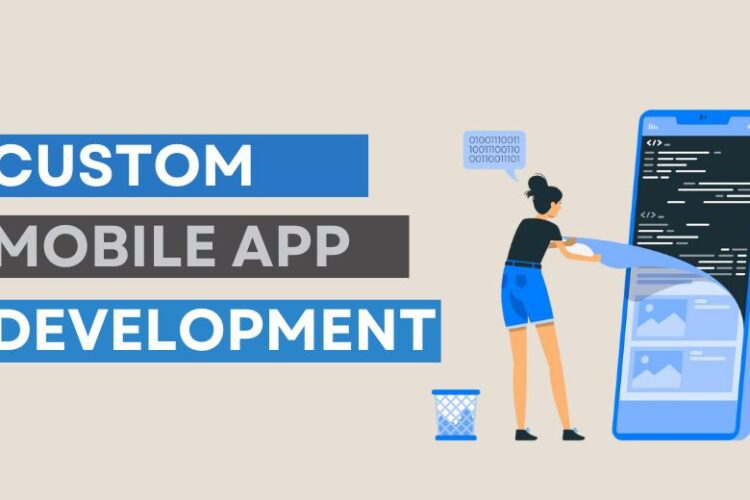A lot of businesses have had to change because AI is growing so quickly. AI is also changing how people use digital goods. AI is used for many things, and it’s currently changing how mobile apps are made. Here in this blog, we are going to dive deep into the importance of the inclusion of AI in modern Mobile App Development applications and the need to keep mobile apps with current technology.
Table of Contents
- Learn about how artificial intelligence (AI) is used to make mobile apps
- AI powers personalization and user engagement
- Enhancing App Performance with AI
- Revolutionizing User Interfaces with AI
- Using AI for Intelligent Automation
- Getting Past Obstacles and Considering Ethics
- Case Studies and Success Stories
- The Future of AI in Mobile App Development
Learn about how artificial intelligence (AI) is used to make mobile apps
According to computer experts, the area of mobile app creation has been a good place to study AI, which lets machines think like humans. AI-powered technologies are changing the way people use mobile apps and how data is processed in many ways. Two examples are predictive analytics and clever personal helpers. Some of the most important AI techniques that power it are computer vision, machine learning, and natural language processing.
AI powers personalization and user engagement
One of the best things about making mobile apps with AI is that it makes each person’s experience unique. AI makes tailored guesses, ideas, and ads by looking at what a person does, what they like, and where they are. It does this by using complex formulas. When artificial intelligence (AI) runs personalized apps, users are more interested and happier. Shopping apps that give ideas based on what the user has bought before are two examples of this type of app. So are exercise apps that change workout plans based on the user’s gym level.
Enhancing App Performance with AI

Improving the overall user experience and making apps run faster are two areas where artificial intelligence (AI) is vital. Anticipating user behaviors and preloading material, AI systems reduce latency and enhance responsiveness through approaches like predictive caching. Analytics driven by AI also aids engineers in finding and fixing performance issues, so the system continues to run smoothly even when the demand is high. Mobile applications that optimize their performance with AI provide users with smooth experiences that encourage them to return for more.
Revolutionizing User Interfaces with AI
Since the addition of AI to our current mobile applications, user interaction with apps has changed. They are more useful, natural, and interesting to engage. The natural learning process (NLP) allows tools like search engines, robots, and many other automated systems to respond more accurately to human interactions. Image recognition and AR are both developed from computer vision technologies. This makes it possible for better visual connections and new levels of involvement. Beyond what is typically available, AI-powered mobile applications provide users with novel ways to interact with data.
Using AI for Intelligent Automation

When developing mobile apps, developers are discovering that AI-driven automation simplifies, expedites, and improves their jobs. Using artificial intelligence (AI) algorithms for testing automation helps developers catch performance issues, security gaps, and faults early on before they affect the final product. Reduced development cycles, faster time-to-market, and increased productivity are all possible outcomes of AI-generated code technology. Using AI for intelligent automation in Android App Development and iOS App Development might lead to increased efficiency and creativity. This would allow developers to focus more on innovation and less on repetitive tasks.
Getting Past Obstacles and Considering Ethics
While AI has a lot of promise for making mobile apps, there are important moral issues and problems that need to be fixed. Three of the most important things that app makers must think about when they add AI to mobile apps are data protection, program biases, and openness. Also, making sure that AI-powered systems are fair, accountable, and include everyone is important for getting people to trust and approve of them. Responsible, privacy- and security-focused AI-driven mobile apps may be created when developers embrace ethical AI methods and follow regulatory rules.
Case Studies and Success Stories
Examining real-life case studies and success stories can help to demonstrate the revolutionary effect of AI on mobile app development. Imagine a ride-sharing software that uses AI algorithms to help riders get where they need to go as quickly as possible with the best possible route suggestions. This program makes time-saving and feature-rich route suggestions by analyzing user locations, traffic patterns, and historical data. In a similar vein, language-learning software may personalize its courses and practice activities for users according to their current level of skill and their preferred methods of learning. These examples showcase how artificial intelligence is revolutionizing mobile apps in many industries, fostering creativity, and providing consumers with real advantages.
The Future of AI in Mobile App Development

The future of artificial intelligence (AI) in developing mobile apps seems bright, thanks to ongoing innovation and progress. By bringing forth previously unseen degrees of personalization, engagement, and intelligence, new AI-powered technologies such as Generative Adversarial Networks, Deep Learning, and Reinforcement Learning have the potential to radically transform the way individuals utilize mobile applications. Plus, when AI is combined with other game-changing technologies like 5G, IoT i.e. Internet of things, and edge computing, new possibilities for linked, smart mobile ecosystems will become available. If developers can keep one step ahead of the AI innovation curve, they may create truly amazing apps, anticipate user wants, and adapt to new conditions. This might lead to mobile applications that greatly improve people’s lives.
Conclusion
Apps made using artificial intelligence (AI) are better quality, more interesting, and easier to use than those made without it. The way people use their phones is being transformed by AI. Two examples are clever programming and customized user experiences. As AI is added to more and more things, the options for making mobile apps, and hybrid app development are almost endless. By using cutting-edge technologies and methods that are based on AI, developers can change the way mobile apps work. Their work can make people happy, improve their lives, and lift them all over the world.
Ready to transform your app idea into reality? Look no further than Zoom into Web, the premier app development company dedicated to bringing your vision to life. Contact us today and let’s create something amazing together!




